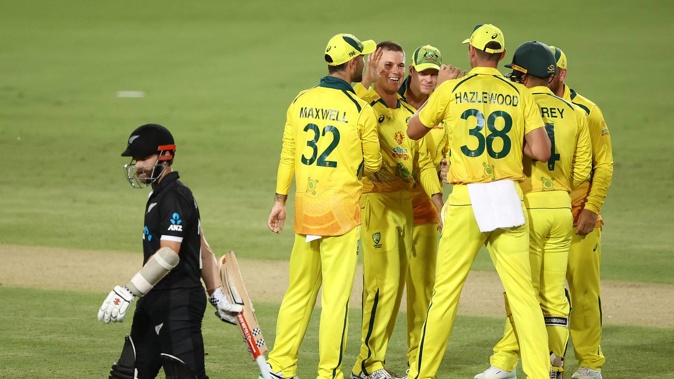
New Zealand's decade-long drought without a win away to Australia will continue. On the basis of this evidence, they might never win there again.
The Black Caps tonight produced one of their worst batting performances in ODI history, bowled out for 82 in Cairns as Australia regained the Chappell-Hadlee Trophy.
The total was the sixth-lowest New Zealand have scored in 787 one-day internationals and allowed Australia to ease to a 113-run victory that sealed the series ahead of the finale on Sunday.
The Black Caps will have only pride on the line in that match - and their reserves of that particular quality must be severely depleted.
They were exceptional for two-third of Australia's innings today, sending in the hosts and reducing them to 117-8 as Trent Boult spearheaded the attack with 4-38. Which made what was to follow even more inexplicable.
First, with the ball, they let Australia's tailenders put together two of the three best partnerships in the match, extending their total to what still seemed a highly attainable 195-9.
Then, with the bat, things got worse. Much worse.
Martin Guptill set the tone for a succession of wickets that owed as much to poor shot selection as they did the opposition's bowling ability, flailing at a wide one to fall for two in the opening over.
None of his teammates fared any better. Kane Williamson top scored with a painful 17 from 58 balls, the agony of that innings exacerbated by his lbw dismissal to a full toss from spinner Adam Zampa.
Mitchell Santner made an unbeaten 16 to spare his side from further ignominy, but there was still plenty of that to be found in a 33-over horror show.
"It obviously wasn't our best effort with the bat - a number of soft dismissals," Williamson told Fox Sports. "We knew the surface was a challenge and 190 was going to take a lot of hard work but, having said that, we didn't apply ourselves well enough."
What application New Zealand did produce contributed hugely to their own downfall. It was one thing to dig in after Devon Conway and Tom Latham both fell in the ninth over - reducing the tourists to 14-3 - but quite another to seem so uninterested in scoring runs.
The Black Caps looked to collectively lose their nerve while suffering through a six-over spell in which as many wickets fell as runs were accumulated (two).
Four batsmen - largely Williamson and Daryl Mitchell - took 29 balls to score a solitary run off Sean Abbott, a 30-year-old who came into the match with three ODI wickets to his name.
By the end of the first 15 overs, New Zealand had faced 74 dot balls, putting themselves under further pressure with every delivery defended.
The overabundance of caution appeared an error in strategy, with the sole aim to survive swallowing any intention to thrive. But Williamson put the focus on individual performances, rather than any cumulative failures.
"Everybody's got their own minds and makes their own decisions," he said. "I suppose we'll reflect on that and we do need to be a lot better than that.
"Adapting to these conditions is key. It's not your regular modern-day one-day cricket - it takes you back in time a bit, trying to graft and build partnerships.
"And if you get an over or two of momentum, which Australia did late in their innings, you can get competitive totals. We weren't able to do that."
That reality was quite clear. The 56-ball partnership of 19 that Williamson and Mitchell formed for the fourth wicket was their best of the match, as regular scalps saw Australia's bowlers dictate throughout.
Zampa took 5-35, Abbott finished with figures of 2-1 from five overs and Mitchell Starc claimed man of the match with 2-12 from seven, but that honour owed as much to his batting efforts. This was hardly a vintage Australian attack.
Starc's unbeaten 38 had earlier lifted the hosts to an unlikely score, sharing with Josh Hazlewood in a 47-run stand that would have frustrated the Black Caps and left them feeling they had ceded crucial runs.
As it turned out, New Zealand never got close, and now look further away than ever from beating Australia across the Tasman for the first time in any format since 2011.
Take your Radio, Podcasts and Music with you









